2017 05 27 metlife last dental bill
电影遗愿清单观后感豆瓣影评150字300字800字1000字2000字
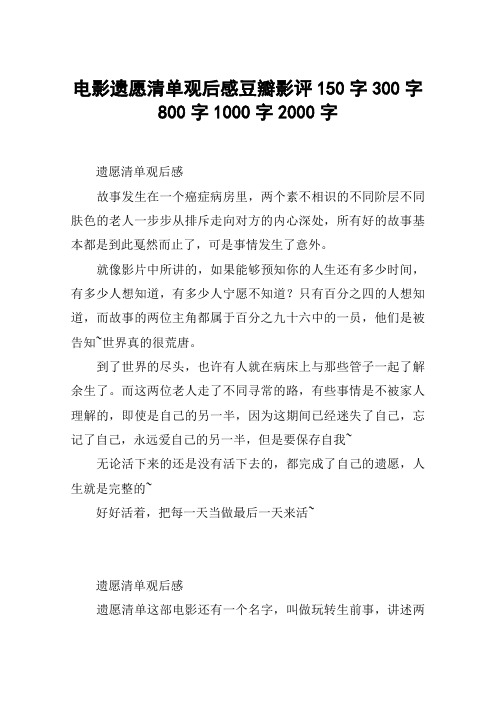
电影遗愿清单观后感豆瓣影评150字300字800字1000字2000字遗愿清单观后感故事发生在一个癌症病房里,两个素不相识的不同阶层不同肤色的老人一步步从排斥走向对方的内心深处,所有好的故事基本都是到此戛然而止了,可是事情发生了意外。
就像影片中所讲的,如果能够预知你的人生还有多少时间,有多少人想知道,有多少人宁愿不知道?只有百分之四的人想知道,而故事的两位主角都属于百分之九十六中的一员,他们是被告知~世界真的很荒唐。
到了世界的尽头,也许有人就在病床上与那些管子一起了解余生了。
而这两位老人走了不同寻常的路,有些事情是不被家人理解的,即使是自己的另一半,因为这期间已经迷失了自己,忘记了自己,永远爱自己的另一半,但是要保存自我~无论活下来的还是没有活下去的,都完成了自己的遗愿,人生就是完整的~好好活着,把每一天当做最后一天来活~遗愿清单观后感遗愿清单这部电影还有一个名字,叫做玩转生前事,讲述两个将要死去的老人不愿意呆在医院等死,果断列出清单,把想要做的事情统统的完成一次,最后两人被葬在高山之巅,完成了最后一个遗愿,欣赏壮丽的风景。
电影看完的时候,又是一种意犹未尽的感觉,说实话,两位男演员非常的出色,对于人物的把握很到位。
电影很普通,没有错综复杂的情节,也没有投资庞大的特效。
两位老人像是在娓娓和你对话一般,讲述着他们的故事。
说实话,吸引我的是这个电影题材,同类型探讨死亡的影片确实不多,因为这种片子通常没有市场,而且死亡这个话题也很沉重,所以很多电影也都绕道而行。
遗愿清单上映后,也确实经历了两边倒的评论,有说好的,也有摇头的。
通常人们都不想知道自己确切的死亡时间,人们总是愿意相信一切都会天长地久。
可是这又是非常没有常识的一件事,人总要死的,而且有时候会很突然,在没有任何准备的时候离开你所熟悉的一切,这并不是电影,而是经常会发生的事情,说不定有一天也会发生在自己的身上。
地震、海啸,也许是一场急病,甚至有时候无意中的摔倒都会要了我们的小命,谁知道呢,人生充满了未知和惊喜。
四级笔试新题型模拟题06
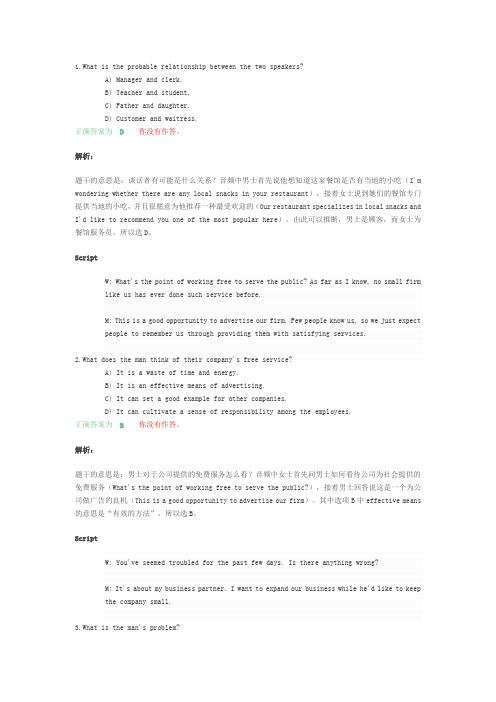
1.What is the probable relationship between the two speakers?A) Manager and clerk.B) Teacher and student.C) Father and daughter.D) Customer and waitress.正确答案为D你没有作答。
解析:题干的意思是:谈话者有可能是什么关系?音频中男士首先说他想知道这家餐馆是否有当地的小吃(I'm wondering whether there are any local snacks in your restaurant),接着女士说到她们的餐馆专门提供当地的小吃,并且很愿意为他推荐一种最受欢迎的(Our restaurant specializes in local snacks and I'd like to recommend you one of the most popular here)。
由此可以推断,男士是顾客,而女士为餐馆服务员,所以选D。
ScriptW: What's the point of working free to serve the public? As far as I know, no small firm like us has ever done such service before.M: This is a good opportunity to advertise our firm. Few people know us, so we just expect people to remember us through providing them with satisfying services.2.What does the man think of their company's free service?A) It is a waste of time and energy.B) It is an effective means of advertising.C) It can set a good example for other companies.D) It can cultivate a sense of responsibility among the employees.正确答案为B你没有作答。
中英对照版_中文版_The_Dead_By_James_Joyces死者_詹姆斯_乔伊斯

詹姆斯·乔伊斯著王智量译看楼人的女儿莉莉简直是双脚离地在飞跑了,她刚刚把一位先生带进底层营业所后面的餐具间,帮他脱掉大衣,断断续续的前门门铃可又响起来了,她只得匆匆奔过空荡荡的过道,给另一位客人开门。
幸亏不要她也伺候女客人。
凯特小姐和朱莉娅小姐想到了这一层,把楼上的浴室改做女客们的化妆室了。
凯特小姐和朱莉娅小姐现在正在那儿,聊着天,笑着,大惊小怪地没事儿瞎忙着,还轮番走到楼梯口,从扶手栏杆上向下张望,朝楼下对莉莉大声喊着,问她是谁来了。
这从来都是件大事情,莫坎家的几位小姐每年一次的舞会。
她们所有的熟人都来参加,家庭的成员,家里的老朋友,朱莉娅唱诗班里的队员,凯特教过的一些已经长大成人的学生,甚至玛丽·简的学生有的也来参加。
没有哪回不是尽欢而散的。
就人们记忆所及,好多好多年了,这舞会一向是开得很成功的;自从她们的哥哥帕特去世,凯特和朱莉娅从斯托尼·巴特那幢房子里搬出来,带上玛丽·简,她们唯一的侄女儿,一块住在阿雪岛上这幢幽暗、冷落的房子里以来,一直是这样。
她们从楼下做粮食生意的富勒姆先生手里租下了楼上一层,已经有足足三十个年头了。
玛丽·简那时候还是个穿短衫裤的小丫头,如今已是家里的台柱子了。
海丁顿街上的管风琴归她弹。
她从专科学校毕业,还每年一度在老音乐厅的楼上开一次学生演奏会。
她的好多学生都是金斯顿和达尔基一带上等人家的子女。
她的姨妈们虽然老成那样了,也都在尽自己的一份力。
朱莉娅,尽管已经两鬓斑白,仍然是“亚当与夏娃”唱诗班的第一女高音,凯特,因为身体太弱,不能多跑动,就在后屋那架老式方型大钢琴上给启蒙学生教音乐课。
莉莉,看楼人的女儿,给她们做女仆的工作。
虽然她们生活得简朴,她们主张要吃的好;样样都买顶好的:带梭形骨头的牛腰肉、三先令一磅的茶叶和上等的瓶装黑啤酒。
莉莉照吩咐做事,极少有差错,所以她跟三位女主人处得挺好。
她们都爱大惊小怪,如此而已。
不过她们唯一不能忍受的是跟她们顶嘴。
《遗愿清单》观后感

《遗愿清单》观后感(经典版)编制人:__________________审核人:__________________审批人:__________________编制单位:__________________编制时间:____年____月____日序言下载提示:该文档是本店铺精心编制而成的,希望大家下载后,能够帮助大家解决实际问题。
文档下载后可定制修改,请根据实际需要进行调整和使用,谢谢!并且,本店铺为大家提供各种类型的经典范文,如工作报告、合同协议、演讲致辞、条据文书、策划方案、规章制度、心得体会、教学资料、作文大全、其他范文等等,想了解不同范文格式和写法,敬请关注!Download tips: This document is carefully compiled by this editor. I hope that after you download it, it can help you solve practical problems. The document can be customized and modified after downloading, please adjust and use it according to actual needs, thank you!Moreover, our store provides various types of classic sample essays, such as work reports, contract agreements, speeches, policy documents, planning plans, rules and regulations, insights, teaching materials, complete essays, and other sample essays. If you want to learn about different sample formats and writing methods, please stay tuned!《遗愿清单》观后感《遗愿清单》观后感细细品味一部作品以后,一定有很多值得分享的心得吧,这时候最关键的观后感不能忘了。
英汉翻译学习Lesson4
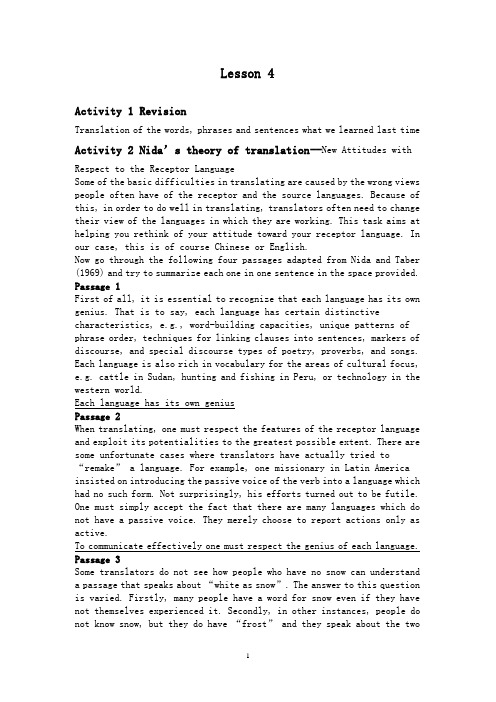
Lesson 4Activity 1 RevisionTranslation of the words, phrases and sentences what we learned last time Activity 2 Nida’s theory of translation--New Attitudes withRespect to the Receptor LanguageSome of the basic difficulties in translating are caused by the wrong views people often have of the receptor and the source languages. Because of this, in order to do well in translating, translators often need to change their view of the languages in which they are working. This task aims at helping you rethink of your attitude toward your receptor language. In our case, this is of course Chinese or English.Now go through the following four passages adapted from Nida and Taber (1969) and try to summarize each one in one sentence in the space provided. Passage 1First of all, it is essential to recognize that each language has its own genius. That is to say, each language has certain distinctive characteristics, e.g., word-building capacities, unique patterns of phrase order, techniques for linking clauses into sentences, markers of discourse, and special discourse types of poetry, proverbs, and songs. Each language is also rich in vocabulary for the areas of cultural focus, e.g. cattle in Sudan, hunting and fishing in Peru, or technology in the western world.Each language has its own geniusPassage 2When translating, one must respect the features of the receptor language and exploit its potentialities to the greatest possible extent. There are some unfortunate cases where translators have actually tried to “remake” a language. For example, one missionary in Latin America insisted on introducing the passive voice of the verb into a language which had no such form. Not surprisingly, his efforts turned out to be futile. One must simply accept the fact that there are many languages which do not have a passive voice. They merely choose to report actions only as active.To communicate effectively one must respect the genius of each language. Passage 3Some translators do not see how people who have no snow can understand a passage that speaks about “white as snow”. The answer to this question is varied. Firstly, many people have a word for snow even if they have not themselves experienced it. Secondly, in other instances, people do not know snow, but they do have “frost” and they speak about the twowith the same term. Thirdly, many languages have other equivalent idioms, e.g., “white as egret(白鹭) feathers”, or “white as fungus (菌类, 蘑菇)” (if there is an especially white form of fungus). The point is that snow as an object is not crucial to the original message. Of course if the form in which a message is expressed is an essential element of the message itself, then there is a limitation in communicating the message from one language to another.Anything that can be said in one language can be said in another, unless the form is an essential element of the message.Passage 4Since all languages differ in form, quite naturally the forms must be changed if one is to preserve the content. The extent to which the forms must be changed in order to preserve the meaning depends on the linguistic and cultural distance between the source and receptor languages. The easiest transitions occur when one translates from a language such as English into German for the two are quite similar to each other both linguistically and culturally. On the other hand, if one is translating from English into Hungarian, the formal shifts will be greater, for Hungarian belongs to a different language family than English. However, Hungarian is still part of the same cultural setting as English. Hence, the shifts are not so extreme. If however, one has to translate from English into Zulu, which belongs t the so-called Bantu family of languages and represents quite a different culture, the formal modifications must be more extreme.To preserve the content of the message the form must be changed. Naturally, a new attitude towards the receptor language implies a new view of the source language as well. We don’t have to go into the great details in this respect, for there are a lot of similarities between the attitude concerning the receptor language and that concerning the source language. It suffices (vi.足够, 有能力vt.使满足) our purpose to bear in mind the following three implications with respect to the source language. (1) The source language is subject to the same limitations as any other natural language; (2) the writers of the source language expect to be understood; and (3) the translator must attempt to reproduce the meaning of a passage as understood by the writer.Activity 3 Languages Differ: Differences in Clause OrderWe have done some serious thinking about the nature of translating. Well, to be a good translator, only serious thinking is not enough. We should also practice as hard as we can and as much as we can. In this activity, we shift our attention to examining the differences in clause order between English and Chinese and the impact this has on our translating. In Chinese, we say就要毕业的学生们仍在教室里学习 while in English the same meaning is presented as Those students who were to graduate very soonwere still studying in the classroom. In the Chinese sentence, the attributive就要毕业的 is placed before 学生们 and the adverbial 在教室里 is placed before 学习, while in the English sentence, the attributive who were to graduate very soon is put after those students and the adverbial in the classroom is put after studying.Task 1 Where to Put the AttributiveQuestions:1.In Chinese, where is an attributive put?2.In English, where is an attributive put?3.Is there a difference between the word attributive and phraseattributive concerning their positions in a sentence?(Both in English and Chinese)In English, when a word is used as an attributive to modify a noun, it is usually placed before the noun, though on some rare occasions it can also be placed after noun. In Chinese an attributive is almost always put before the noun it modifies.Now translate the following phrases into Chinese, paying special attention to the positions of the attributives.1.a well-managed company 一家管理完善的公司2.the architect’s luxurious house 建筑师的豪华住宅3.the ancient Chinese philosophers 中国古代的哲学家们4.something urgent 紧急的事情5.somewhere unknown 不为人所知的某个地方Of course, not only can single words serve as attributives, but short phrases as well. In English, when a short phrase is used as an attributive to modify a noun, it is usually placed after the noun, while in Chinese it is usually put before the noun.Now translate the following items into Chinese, again paying special attention to the positions of the attributives.1.a project of building up the first corpus of spoken Chinese in China (创立中国第一个汉语口语语料库的项目)2.a student with a lot of complaints for the university(一个对学校颇多抱怨的学生)3.particles moving round their atomic nucleus(环绕原子核运动的粒子)4.a machine able to recognize human voice(能识别人的声音的机器)5.a girl wearing a long white dress(穿着白色长裙的姑娘)6.a book easy to read(一本容易读的书)Read the textbook P23-24Conclusion: Usually in English, the word attributive is put before the noun, and the phrase attributive is put after the noun, but in Chinese, it is almost always for attributives to be put before the noun.Task 2 Where to Put the Adverbial1.In Chinese, where is an adverbial put?2.In English, where is an adverbial put?3.Is there a difference between the word adverbial which modifies an adjective and the word adverbial which modifies a verb concerning their positions in a sentence?(Both in English and Chinese)Now translate the following sentences into Chinese or English, paying special attention to the positions of the adverbials.1.She was not particularly beautiful, but she certainly left a deepimpression on everybody.(她并不是特别地美丽,但她显然给每个人都留下了深刻的印象。
《一个人的朝圣》读后感(13篇)
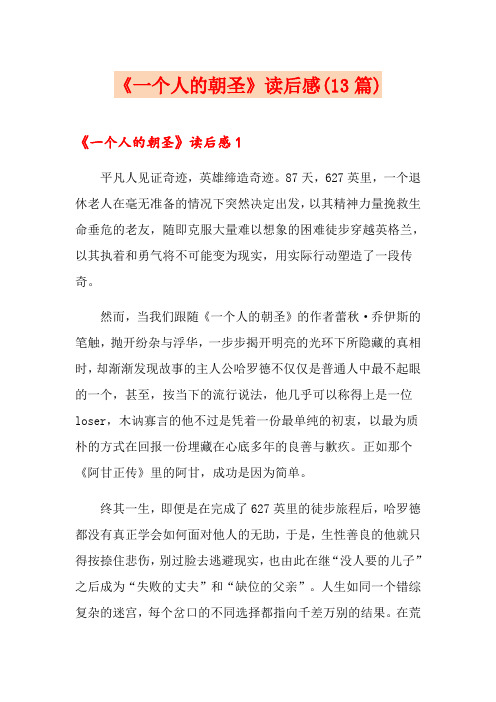
布克奖被认为是当代英语小说界的最高奖项,也是世界文坛上影响最大的文学大奖之一。从1969年开始颁发,每年颁发一次。最初只有英国、爱尔兰,以及英联邦国家的英文原创作家有资格入围参评,20__年起,全世界所有用英语写作的作家都可以参评布克奖。荣获布克奖几乎已经成为"最好看的英文小说"代名词,是广受世界瞩目和讨论的小说奖。
《一个人的朝圣》读后感
在一片碧绿的草原上,牛羊正咀嚼着青草,一条连接着金丝布里奇与贝里克的一条公路像一根白色的线,穿过这匹绿布。一位年过花甲的老人正拄着一根拐棍,行走在这条公路上。他就是哈罗德·弗莱。此刻,他正走着,走着,走向那遥远的地平线……
虽然这是我前段时间读的——《一个人的朝圣》。尽管已经过去了很长时间,但我却仍记忆犹新。
每一个星期,哈罗德总会打电话给疗养院,只为传达一个信息:请让奎妮等我,哈罗德,我正在走去的路上!而每天,奎妮总是躺在床上,看着南方的天空,心里始终相信:哈罗德一定会过来看我的,我等着他。正是这份信仰的力量,使奎妮坚守着,更好地活着,也让哈罗德坚持着走来,让他俩相见。
尽管只见了奎妮最后一面,但是他,哈罗德的好好活下去,珍惜与自己的妻子莫琳所剩无几的时光的信仰从此却在他的心底扎根,逐渐成熟,充实了他的生活,挥之不去。这次徒步的朝圣之旅对于哈罗德来说,改变了他与他的妻子的生活,是一次灵魂的洗礼,虽然它是发生在垂暮之年。哈罗德通过这次旅行,更加深刻地意识到,生命是如此的短暂,生命是多么的宝贵,妻子默默地在背后照料他的生活起居,自己应该停下来,好好陪伴她安度晚年。
这本书讲述了主人公哈罗德徒步走过627英里去看望身患癌症的老友奎妮。二十年前哈罗德的儿子戴维自杀,哈罗德酗酒后,跑到工厂把老板最喜爱的玻璃玩偶给砸了。在得知情况后,杰妮默默地替哈罗德背黑锅,离开了工厂。在收到来自身患绝症的奎妮的信之后,哈罗德同一个加油站女孩谈论了关于信仰的问题,萌生了徒步走去看奎妮的想法。于是,一个千里跋涉的故事开始了。
娱乐美联英语 《唐顿》大小姐生日之际为病逝未婚夫准备葬礼
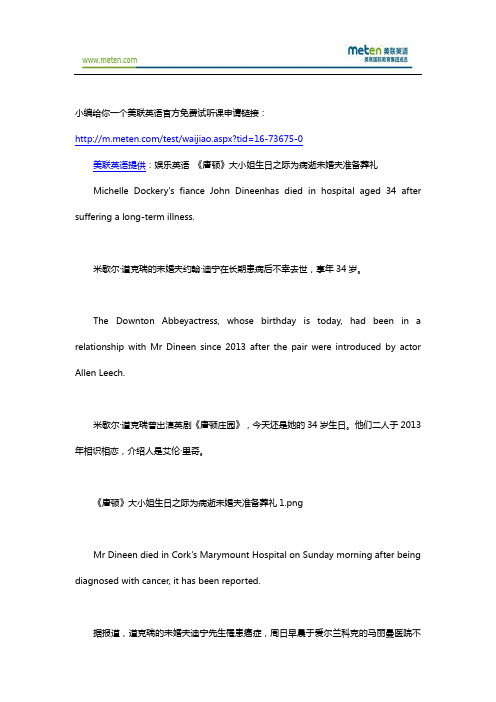
小编给你一个美联英语官方免费试听课申请链接:/test/waijiao.aspx?tid=16-73675-0美联英语提供:娱乐英语《唐顿》大小姐生日之际为病逝未婚夫准备葬礼Michelle Dockery's fiance John Dineenhas died in hospital aged 34 after suffering a long-term illness.米歇尔·道克瑞的未婚夫约翰·迪宁在长期患病后不幸去世,享年34岁。
The Downton Abbeyactress, whose birthday is today, had been in a relationship with Mr Dineen since 2013 after the pair were introduced by actor Allen Leech.米歇尔·道克瑞曾出演英剧《唐顿庄园》,今天还是她的34岁生日。
他们二人于2013年相识相恋,介绍人是艾伦·里奇。
《唐顿》大小姐生日之际为病逝未婚夫准备葬礼1.pngMr Dineen died in Cork's Marymount Hospital on Sunday morning after being diagnosed with cancer, it has been reported.据报道,道克瑞的未婚夫迪宁先生罹患癌症,周日早晨于爱尔兰科克的马丽曼医院不幸去世。
The hospital is known for its pain management facilities in Ireland, specialising in palliative care services for terminally ill patients. He is understood to have been treated in London before returning home to Ireland.这家医院最出名的便是其疼痛管理设备,专为晚期病患提供姑息治疗。
新概念英语第一册课文word版

Lesson1: Excuse me!Excuse me!Yes?Is this your handbag?Pardon?Is this your handbag?Yes, it is.Thank you very much.Lesson 3:Sorry sir.My coat and my umbrella please. Here is my ticket.Thank you sir.Number five.Here is your umbrella and your coat. This is not my umbrella.Sorry sir.Is this your umbrella?No, it isn't.Is this it?Yes, it is.Thank you very much.Lesson 5: Nice to meet you.Good morning.Good morning, Mr. Blake.This is Miss Sophie Dupont.Sophie is a new student.She is a French.Sophie, this is Hans.He is German.Nice to meet you.And this is Naoko.She’s Japanese.Nice to meet you.And this is Chang-woo.He’s Korean. (朝鲜人)Nice to meet you.And this is Luming.He’s Chinese.Nice to meet you.And this is Xiaohui.She’s Chinese, too.Nice to meet you.Lesson 7: Are you a teacher? I’m a new student.My name’s Robert.Nice to meet you.My name’s Sophie.Are you French?Yes, I’m.Are you French, too?No, I’m not.What nationality are you? I’m Italian.Are you a teacher?No, I’m not.What’s your job?I’m a keyboard operator. What’s your job?I’m an engineer.Lesson 9: How are you today? Hello, Helen.Hi, Steven.How are you today?I’m very well, Thank you. And you?I’m fine, thanks.How is Tony?He’s fine, Thanks.How’s Emma?She’s very well, too, Helen. Goodbye, Helen.Nice to see you.Nice to see you, too, Steven. Goodbye.Lesson 11: Is this your shirt? Whose shirt is that?Is this your shirt, Dave?No, sir.It’s not my shirt.This is my shirt.My shirt is blue.Is this shirt Tim’s?Perhaps it is, sir.Tim’s shirt is white.Tim!Yes, sir.Is this your shirt?Yes, Sir.Here you are.Catch.Thank you, sir.Lesson 13: A new dressWhat color is your new dress?It is green.Come upstairs and see it. Thanks you.Look!Here it is!That’s a nice dress.It’s very smart.My hat’s new, too.What color is it?It’s the same color.It’s green, too.That’s a lovely hat.Lesson 15: Your passport, please. Are you Swedish?No, we are not.We are Danish.Are your friends Danish, too? No, they aren’t.They are Norwegian.Your passport, please.Here they are.Are there your cases?No, they aren’t.Our cases are brown.Here they are.Are you tourists?Yes, we are.Are your friends tourists too?Yes, they are.That’s fine.Thank you very much.Lesson 17: How do you doCome and meet our employees, Mr. Richards. Thank you, Mr. Jackson.This is Nicola Grey, and this is Claire Taylor. How do you do?Those women are very hard-working.What are their jobs?They’re keyboard operators.This is Michael Baker, and this is Jeremy Short. How do you do?They aren’t very busy!What are their jobs?They’re sales reps.They are very lazy.Who is this young man?This is Jim.He is our office assistant.Lesson 19: Tired and thirstyWhat’s the mater, children?We are tired and thirsty, Mum.Sit down here.Are you all right now?No, we aren’t.Look!There’s an ice c ream man.Two ice creams please.Here you are, children.Thanks, Mum.These ice creams are nice.Are you all right now?Yes, we are, thank you.Lesson 21: Which book?Give me a book please, Jane.Which book?This one?No, not that one. The red one.This one?Yes, please.Here you are.Thank you.Lesson 23: Which glasses?Give me some glasses please, Jane. Which glasses?These glasses.No, not those. The ones on the shelf. These?Yes, please.Here you are.Thanks.Lesson25: Mr s. Smith’s kitchenMrs. Smith’s kitchen is small.There is a refrigerator in the kitchen.The refrigerator is white.It is on the right.There is an electric cooker in the kitchen. The cooker is blue.It is on the left.There is a table in the middle of the room. There is a bottle on the table.The bottle is empty.There is a cup on the table, too.The cup is clean.Lesson 27: Mrs. Smith’s living roomMrs. Smith’s living room is large.There is a television in the room.The television is near the window.There are some magazines on the television. There is a table in the room.There are some newspapers on the table.There are some armchairs in the room.The armchairs are near the table.There is a stereo in the room.The stereo is near the door.There are some books on the stereo.There are some pictures in the room.The pictures are on the wall.Lesson 29: Come in, Amy.Come in, Amy.Shut the door, please.This bedroom is very untidy.What must I do, Mrs. Jones?Open the window and air the room.Then put these clothes in the wardrobe.〔衣橱〕Then make the bed.Dust the dressing table.Then sweep the floor.Lesson31: Where’s Sally?Where’s Sally, Jack?She’s in the garden, Jane.What’s she doing?She’s sitting under the tree.Is Tim in the garden, too?Yes, he is.He’s climbing the tree.I beg your pardon?Who’s climbing the tree.Tim is.What about the dog?The dog’s in the garden, too.It’s running across the grass.It’s running after a cat.Lesson 33: A fine dayIt’s a fine day today.There are some clouds in the sky, but the sun is shining. Mrs. Jones’s with his family.They are walking over the bridge.There are some boats on the river.Mrs. Jones and his wife are looking at them.Sally is looking at a big ship.The ship is going under the bridge.Tim is looking at an aeroplane.The aeroplane is flying over the river.Lesson 35: Our villageThis is a photograph of our village.Our village is in a valley.It is between two hills.The village is on a river.Here is another photograph of the village.My wife and I are walking alone the banks of the river. We are on the left.There is a boy in the water.He is swimming across the river.Here is another photograph.This is the school building.It is beside a park.The park is on the right.Some children are coming out of the building.Some of them are going into the park.Lesson37: Making a bookcaseYou’re working hard, George.What are you doing?I’m making a bookcase.Give me that hammer please, Dan.Which hammer.This one?No, not that one.The big one.Here you are.Thanks, Dan.What are you going to do now, George?I’m going to paint it.What colour are you going to paint it?I’m going to paint it pink.Pink!This bookcase isn’t for me.It’s for my daughter, Susan.Pink’s her favorite colour.Lesson39: Don’t drop it!What are you going to do with that vase, Penny? I’m going to put it on this table, Sam.Don’t do that.Give it to me.What are you going to do with it?I’m going to put it here, in front of the window. Be careful.Don’t drop it!Don’t put it there, Sam.Put it here, on this shelf.There we are!It’s a lovely vase.Those flowers are lovely, too.Lesson41: Penny’s bagIs that bag heavy, Penny?Not very.Here!Put it on this chair.What’s in it?A piece of cheese.A loaf of bread.A bar of soap.A bar of chocolate.A bottle of milk.A pound of sugar.Half a pound of coffee.A quarter of a pound of tea.And a tin of tobacco.Is that tin of tobacco for me?Well, it’s certainly not for me!Lesson43: Hurry up!Can you make the tea, Sam?Yes, of course I can, Penny.Is there any water in this kettle(水壶)?Yes, there is.Where’s the tea?It’s over there, behind the teapot.Can you see it?I can see the teapot, but I can’t see the tea.There it is!It’s in front of you.Ah yes, I can see it now.Where are the cups?There are some in the cupboard〔碗橱〕.Can you find them?Yes. Here they are.Hurry up, Sam.The kettle’s boiling.lesson45THE BOSS: Can you come here a minute please, Bob?Bob: Yes, sir?THE BOSS: Where's Miss Jones?Bob: She's next door. She's in her office, sir.THE BOSS: Can she type this letter for me? Ask her please. Bob: Yes, sir.Bob: Can you type this letter for the boss please, Miss Jones? MISS JONES: Yes, of course I can.Bob: Here you are.MISS JONES: Thank you, Bob.MISS JONES: Bob!Bob: Yes? What's the matter?MISS JONES: I can't type this letter.Miss Jones: I can't read it! The boss's handwriting is terrible! lesson47 A cup of coffeeMRS YOUNG: Do you like coffee, Mrs Price?MRS PRICE: Yes, I do.MRS YOUNG: Do you want a cup?MRS PRICE: Yes, please. Mrs Young.MRS YOUNG: Do you want any sugar?MRS PRICE: Yes, please.MRS YOUNG: Do you want any milk?MRS PRICE: No, thank you. I don't like milk in my coffee.I like black coffee.MRS YOUNG: Do you like biscuits?MRS PRICE: Yes, I do.MRS YOUNG: Do you want one?MRS PRICE: Yes, please.l esson49 At the butcher’sBUTCHER: Do you want any meat today, Mrs Bird?MRS BIRD: Yes, please.BUTCHER: This lamb's very good.MRS BIRD: I like lamb, but my husband doesn't .BUTCHER: What about some steak? This is a nice piece.MRS BIRD: Give me that piece please.BUTCHER: Do you want a chicken, Mrs Bird? They're very nice.MRS BIRD: No, thank you.MRS BIRD: My husband likes steak, but he doesn't like chicken. BUTCHER: To tell you the truth(说实在的), Mrs. Bird, I don't like chicken, either !lesson51 A pleasant climateHANS: Where do you come from?DIMITRI: I come from Greece.HANS: What's the climate like in your country?DIMITRI: It's very pleasant.Hans: What's the weather like in spring?DIMITRI: It's often windy in March. It's always warm in April and May, but it rains sometimes.HANS: What's it like in summer?DIMITRI: It's always hot in June, July and August. The sun shines every day.HANS: Is it cold or warm in autumn?DIMITRI: It's always warm in September and October. It's often cold in November and it rains sometimes.HANS: Is it very cold in winter?DIMITRI: It's often cold in December, January and February. It snows sometimes.lesson53 An interesting climateHANS: Where do you come from?JIM: I come from England.HANS: What's the climate like in your country?Jim: It's mild〔温和的〕, but it's not always pleasant.Jim: The weather's often cold in the North and windy in the East. It's often wet in the West and sometimes warm in the South.Hans: Which seasons do you like best?Jim: I like spring and summer. The days are long and the nights are short. The sun rises early and sets late. I don't like autumn andwinter. The days are short and the nights are long. The sun riseslate and sets early. Our climate is not very good, but it's certainlyinteresting. It's our favorite subject of conversation.lesson55 The Sawyer familyThe Sawyers live at 87 King Street.In the morning, Mrs Sawyer goes to work and the children go to school. Their father takes them to school every day.Mrs Sawyer stays at home every day. She does the housework. She always eats her lunch at noon.In the afternoon, she usually sees her friends. They often drink tea together.In the evening, the children come home from school. They arrive home early.Mr Sawyer comes home from work. He arrives home late.At night, the children always do their homework. Then they go to bed. Mr Sawyer usually reads his newspaper, but sometimes he and his wife watch television.lesson57 An unusual dayIt is eight o'clock. The children go to school by car every day, but today, they are going to school on foot.It is ten o'clock. Mrs Sawyer usually stays at home in the morning, but this morning, she is going to the shops.It is four o’clock. In the afternoon, Mrs Sawyer usually drinks tea in the living-room, but this afternoon, she is drinking tea in the garden.It is six o’clock. In the evenin g, the children usually do their homework, but this evening, they are not doing their homework. At the moment, they are playing in the garden.It is nine o’clock, Mr. Sawyer usually reads his newspaper at night, but he is not reading his newspaper tonight. At the moment, he is reading an interesting book.lesson59 Is that all?LADY: I want some envelopes please.STATIONER: Do you want the large size, or the small size?LADY: The large size please.LADY: Have you any writing-paper〔信纸〕?Stationer: Yes, we do.Stationer: I haven't any small pads. I only have large ones. Do you want a pad 〔便签簿〕?LADY: Yes, please.LADY: And I want some black ink and some glue.Stationer: A bottler of ink and a bottle of glue.LADY: And I want a large box of chalk, too.Stationer: I only have small boxes. Do you want one?LADY: No, thank you.Stationer: Is that all?LADY: That's all, thank you.Stationer: What else do you want?LADY: I want my change.lesson61MR WILLIANMS: Where's Jimmy?MRS WILLIAMS: He's in bed.MR WILLIAMS: What's the matter with him?MRS WILLIAMS: He feels ill.MR WILLIAMS: He looks ill.MRS WILLIAMS: We must call the doctor.MR WILLIAMS: Yes, we must.MR WILLIAMS: Can you remember the doctor's telephone number?MRS WILLIAMS: Yes. It's 09754.DOCTOR: Open your mouth, Jimmy. Show me your tongue. Say, 'Ah'.MR WILLIMAMS: What's the matter with him, doctor?DOCTOR: He has a bad cold, Mr Williams, so he must stay in bed for a week.MRS WILLIAMS: That's good news for Jimmy.DOCTOR: Good news? Why?MR WILLIAMS: Because he doesn't like school!lesson63 Thank you , doctor.DOCTOR: How's Jimmy today?MRS WILLIAMS: He's better , thank you, doctor.DOCTOR: Can I see him please, Mrs Williams?MRS WILLIAMS: Certainly, doctor. Come upstairs.DOCTOR: You look very well, Jimmy. You are better now, but you mustn't get up yet.You must stay in bed for another two days.DOCTOR: The boy mustn't go to school yet, Mrs Williams. And he mustn't eat rich food.Mrs Williams: Does he have a temperature, doctor?Doctor: No, he doesn’t.MRS WILLIAMS: Must he stay in bed?DOCTOR: Yes. He must remain in bed for another two days. He can get up for about two hours each day, but you must keep the room warm. DOCTOR: Where's Mr Williams this evening?MRS WILLIAMS: He's in bed, doctor.Can you see him, please? He has a bad cold, too!lesson65 Not a babyFATHER: What are you going to do this evening, Betty?Betty: I'm going to meet some friends, Dad.FATHER: You mustn't come home late. You must be home at half past ten. BETTY: I can’t get home so early, Dad.Can I have the key to the front door, please?FATHER: NO, you can't.MOTHER: Betty's eighteen years old, Tom. She's not a baby. Give her the key.She always comes home early.FATHER: Oh, all right!FATHER: Here you are. But you mustn't come home after a quarter past eleven.Do you hear?BETTY: Yes, Dad.BETTY: Thanks, Mum.MOTHER: That's all right. Goodbye. Enjoy yourself!BETTY: We always enjoy ourselves, Mum. Bye, bye.lesson67 The weekendMRS JOHNSON: Hello, Mrs Williams. Were you at the butcher's?MRS WILLIAMS: Yes. I was. Were you at the butcher’s ,too?MRS JOHNSON: No, I wasn’t. I was at the greengrocer’s. How’s Jimmy today?MRS WILLIAMS: He’s very well, thank you.MRS JOHNSON: Was he absent from school last week?MRS WILLIAMS: Yes, he was. He was absent on Monday, Tuesday,Wednesday and Thursday. How are you all keeping?〔你们身体怎么样?〕MRS JOHNSON: Very well, thank you. We’re going to spen d three days in thecountry. We’re going to stay at my mother’s for the week-end. MRS WILLIAMS: Friday, Saturday and Sunday in the country! Aren’t you lucky!Lesson69 The car raceThere is a car race near our town every year. In 1968, there was a very big race. There were hundreds of people there. My wife and I were at the race. Our friends, Julie and Jack were there, too. You can see us in the crowd. We are standing on the left.There were twenty cars in the race. There were English cars, French cars, German cars, Italian cars, American cars and Japanese cars.It was an exciting finish. The winner was Billy Stewart. He was in car number fifteen. Five other cars were just behind him.On the way home, my wife said to me, “Don’t drive so quickly! You’re not Billy Stewart!”Lesson 71 He’s awfulJane : What’s Ron Marston like , Pauline ?Pauline : He’s awful ! He telephoned me four times yesterday , and three times the day before yesterday.Pauline: He telephoned the office yesterday morning and yesterday afternoon. My boss answered the telephone .Jane : What did your boss say to him ?Pauline: He said ,”Miss White is typing letters .She can’t speak to you now !”Pauline : Then I arrived home at six o’clock yesterday evening .He telephoned again .But I didn’t answer the phone !Jane : Did he telephone again last night ?Pauline : Yes , he did . He telephoned at nine o’clock .Jane : What did you say to him ?Pauline : I said ,”This is Pauline ‘s mother . Please don’t telephone my daughter again !”Jane : Did he telephone again ?Pauline : No , he didn’t !Lesson73 The way to King StreetLast week Mrs Mills went to London. She does not know London very well, and she lost her way.Suddenly, she saw a man near a bus-shop. “ I can ask him the way.” She said to herself.“Excuse me,” she said.“Can you tell me the way to King Street please?”The man smiled pleasantly. He did not understand English! He spoke German. He was a tourist.Then he put his hand into his pocket, and took out a phrase-book.He opened the book and found a phrase. He read the phrase slowly.“I am sorry,” he said. “ I do not speak English.”Lesson 75 Uncomfortable shoesLADY : Have you any shoes like these?SALESMAN: What size?Lady: Size five.Salesman: What colour?Lady: Black.Salesman: I’m sorry. We haven’t any.Lady: But my sister bought this pair last month.Salesman: Did she buy them here?Lady: No, she bought them in the U.S.Salesman: We had some shoes like those a month ago, but we haven’t any now. Lady: Can you get a pair for me please?Salesman: I’m afraid that I can’t. They were in fashion last year and the year before last.But they’re not in fashion this year.Salesman: These shoes are in fashion now.Lady: They look very uncomfortable.Salesman: They are very uncomfortable. But women always wear uncomfortable shoes!Lesson77 Terrible toothacheNurse: Good morning, Mr Croft.Mr Croft: Good morning, nurse. I want to see the dentist, please.Nurse: Have you an appointment?〔有预约吗?〕Mr Croft: No, I haven’t .Nurse: Is it urgent?Mr Croft: Yes, it is . It’s very urgent. I feel awful. I have a terrible toothache. Nurse: Can you come at 10 am on Monday, April 24th?Mr Croft: I must see the dentist now, nurse.Nurse: The dentist is very busy at the moment. Can you come at 2:00 PM? Mr Croft: That’s very late. Can’t the dentist see me now?Nurse: I’m afraid that he can’t , Mr Croft. Can’t you wait till this afternoon?Mr Croft: I can wait, but my toothache can’t !Lesson79 Peggy’s shopping-listTom: What are you doing, Peggy?Peggy: I’m making a shopping-list, Tom.Tom: What do we need?Peggy: We need a lot of things this week.Peggy: I must go to the grocer’s. We haven’t got much tea or coffee, and we haven’t got any sugar or jam.Tom: What about vegetables?Peggy: I must go to the greengrocer’s. We haven’t got many tomatoes, but we’ve got a lot of potatoes.Peggy: I must go to the butcher’s, too. We need some meat. We haven’t got any meat at all.Tom: Have we got any beer and wine?Peggy: No, we haven’t. And I’m not going to get any!Tom: I hope that you’ve got some money.Peggy: I haven’t got much.Tom: Well, I haven’t got much either!Lesson81 Roast beef and potato.John: Hello, Peggy! W here’s Tom?Peggy: He’s upstairs. He’s having a bath.Peggy: Tom!Tom: Yes?Peggy: John’s here.Tom: I’m nearly ready.Tom: Hello, John. Have a cigarette.John: No thanks, Tom.Tom: Have a glass of whisky then.John: O.K. Thanks.Tom: Is dinner ready, Peggy?Peggy: It’s nearly ready. We can have dinner at seven o’clock.Tom: John and I had lunch together today. We went to a restaurant.Peggy: What did you have?Tom: We had roast beef and potatoes.Peggy: Oh!Tom: What’s the matter, Peggy?Peggy: Well, you’re going to have roast beef and potatoes again tonight!Lesson83 Going on a holidayPeggy: Hello, John. Come in.Tom: Hello, John. We’re having lunch. Do you want to have lunch with us? John: No thank you, Tom. I’ve already had lunch. I had lunch at half past twelve. Peggy: Have a cup of coffee then.John: I’ve just had a cup, thank you. I had one after my lunch.Tom: Let’s go into the living-room, Peggy. We can have our coffee there. Peggy: Excuse the mess, John. This room’s very untidy. We’re packing our suitcases. We’re going to leave tomorrow. Tom and I are going to have aholiday.John: Aren’t you lucky!Tom: When are you going to have a holiday, John?John: I don’t know. I’ve already had my holiday this year.Peggy: Where did you go?John: I stayed at home!Lesson85 Paris in the SpringGeorge: Hello, Ken.Ken: Hello, George.George: Have you just been to the cinema?Ken: Yes, I have.George: What’s on?Ken: “Paris in the Spring”.George: Oh, I’ve already seen it. I saw it on a B.B.C. television programme last year.It’s an old film, but it’s very good.Ken: Paris is a beautiful city.George: I have never been there. Have you ever been there, Ken?Ken: Yes, I have. I was there in April.George: Paris in the spring, eh?Ken: It was spring, but the weather was awful. It rained all the time.George: Just like dear old London!Lesson87 A car crashMr Wood: Is my car ready yet?Attendant: I don’t know, sir.What’s the licence number of your car?Mr Wood: It’s LFZ 312 G.Attendant: When did you bring it to us?Mr Wood: I bought it hear three days ago.Attendant: Ah yes, I remember now.Mr Wood: Have your mechanics finished yet?Attendant: No, they’re still working on it. Let’s go into the garage and have a look at it.Attendant: Isn’t that your car?Mr Wood: Well, it was my car.Attendant: Didn’t your wife have a crash?Mr Wood: That’s right. She drove it into a lamp post〔电线杆〕. Can your mechanics repair it?Attendant: Well, they’re trying to repair it, sir. But to tell you the truth, you need a new car.Lesson89 For saleMr Hill: Good afternoon. I believe that this house is for sale〔待售〕.Mr West: That’s right.Mr Hill: May I have a look at it please?Mr West: Yes, of course. Come in.Mr Hill: How long have you lived here?Mr West: I have lived here for twenty years.Mr Hill: Twenty years! That’s a long time.Mr West: Yes, I have been here since 1947.Mr Hill: Then why do you want to sell it?Mr West: Because I have just retired. I want to buy a small house in the country. Mr Hill: How much does this house cost?Mr West: £6850.Mr Hill: That’s a lot of money!Mr West: It’s worth every penny of it.Mr Hill: Well, I like the house, but I can’t decide yet. My wife must see it first. Mr West: Women always have the last word.Lesson91 Poor WestMrs Smith: Has Mr West sold his house yet?Mrs Brown: Yes, he has. He sold it last week.Mrs Smith: Has he moved to his new house yet?Mrs Brown: No, not yet. He’s still here. He’s going to move tomorrow.Mrs Smith: When? Tomorrow morning?Mrs Brown: No. Tomorrow afternoon. I’ll miss him. He has always been a good neighbour.Mrs Green: H e’s a very nice person. We shall all miss him.Mrs Smith; When will the new people move into this house?Mrs Brown: I think that they will move in the day after tomorrow.Mrs Green: Will you see Mr West today, Mrs Brown?Mrs Brown: Yes, I will.Mrs Green: Please give him my regards. 〔give one’s regards to sb.向sb.问候〕Mr Smith: Poor Mr West! He didn’t want to leave this house.Mrs Brown: No, he didn’t want to leave, but his wife did!Lesson93 Our new neighborMr Hill is our new next-door neighbour. He’s a pilot.He was in the .(皇家空军)He will fly to New York next month.The month after next he will fly to Tokyo.At the moment〔现在〕, he’s in Madrid. He flew to Spain a week ago.He will return to London the week after next.He’s only f orty-one years old, and he has already been to nearly every country in the world.Mr Hill is a very lucky man. But his wife isn’t very lucky. She usually stays at home!Lesson95 Ticket, please.George: Two return tickets to London please. What time will the next train leave?Attendant: At nineteen minutes past eight.George: Which platform?Attendant: Platform Two. Over the bridge.Ken: What time will the next train leave?George: At eight nineteen.Ken: We’ve got plenty of time.George: It’s only three minutes to eight.Ken: Let’s go and have a drink. There’s a bar next door to the station. George: We had better go back to the station now, Ken.Porter: Tickets please.George: We want to catch the eight nineteen to London.Porter: You’ve just missed it!George: What! It’s only eight fifteen.Porter: I’m sorry, sir. That clock’s ten minutes slow.George: When’s the next train?Porter: In five hours’ time!Lesson97 A small blue caseMr Hall: I left a suitcase on the train to London the other day.Attendant: Can you describe it, sir?Mr Hall: It’s a small blue case and it’s got a zip. There’s a label on the handle with my name and address on it.Attendant: Is this case yours?Mr Hall: No, that’s not mine.Attendant: What about this one? This one’s got a label.Mr Hall: Let me see it.Attendant: What’s you name and address?Mr Hall: David Hall,83, Bridge Street.Attendant: That’s right.D.N.Hall.83.Bridge Street.Attendant: Three pound and fifty pence please.Mr Hall: Here you are.Attendant: Thank you.Mr Hall: Hey!Attendant: What’s the matter?Mr Hall: This case doesn’t belong to me! You’ve given me the wrong case!Lesson99 Ow!Ted : Ow!Pat: What’s the matter, Ted?Ted: I slipped and fell downstairs.Pat: Have you hurt yourself?Ted: Yes, I have. I think that I’ve hurt my back.Pat: Try and stand up. Can you stand up?Here. Let me help you.Ted: I’m sorry, Pat. I’m afraid that I can’t get up.Pat: I think that the doctor had better see you. I’ll telephone Dr Carter. Pat: The doctor says that he will come at once. I’m sure that you need an X-ray, Ted.Lesson101 A card from JimmyGrandmother: Read Jimmy’s card to me please, Mary.Mary: “I have just arrived in Scotland and I’m staying at a Youth Hostel.”Grandmother: Eh?Mary: He says he’s just arrived in Scotland.He sa ys he’s staying at a Youth Hostel.You know he’s a member of the Y.H.A.Grandmother: The what?Mary: The Y.H.A., mother. The Youth Hostel’s Association. Grandmother: What else does he say?Mary: “I’ll write a letter soon. I hope you are all well.”Grandmother: What? Speak up, Mary. I’m afraid I can’t hear you.Mary: He says he’ll write a letter soon. He hopes we are all well. “ Love, Jimmy.”Grandmother: Is that all? He doesn’t say very much, does he?Mary: He can’t write very much on a card, mother.Lesson103 The Intelligence testHarry: How was the examination, Dick?Dick: Not too bad. I think I passed in English and Mathematics. The questions were very easy. How about you, Harry?Harry: The English and Maths papers weren’t easy enough for me. I hope I haven’t failed.。
遗愿清单观后感2
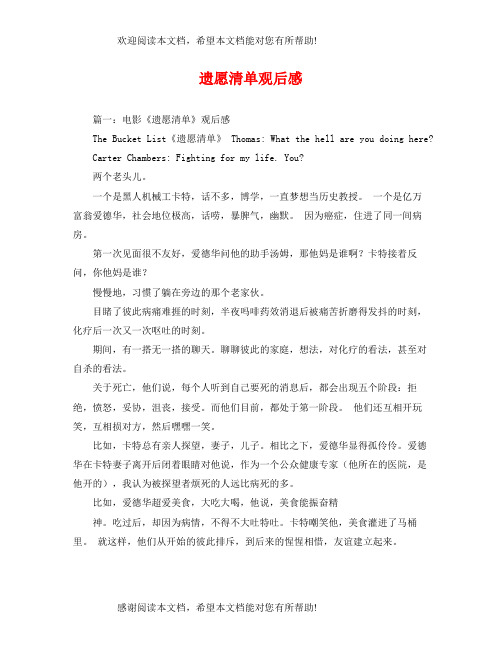
遗愿清单观后感篇一:电影《遗愿清单》观后感The Bucket List《遗愿清单》 Thomas: What the hell are you doing here?Carter Chambers: Fighting for my life. You?两个老头儿。
一个是黑人机械工卡特,话不多,博学,一直梦想当历史教授。
一个是亿万富翁爱德华,社会地位极高,话唠,暴脾气,幽默。
因为癌症,住进了同一间病房。
第一次见面很不友好,爱德华问他的助手汤姆,那他妈是谁啊?卡特接着反问,你他妈是谁?慢慢地,习惯了躺在旁边的那个老家伙。
目睹了彼此病痛难捱的时刻,半夜吗啡药效消退后被痛苦折磨得发抖的时刻,化疗后一次又一次呕吐的时刻。
期间,有一搭无一搭的聊天。
聊聊彼此的家庭,想法,对化疗的看法,甚至对自杀的看法。
关于死亡,他们说,每个人听到自己要死的消息后,都会出现五个阶段:拒绝,愤怒,妥协,沮丧,接受。
而他们目前,都处于第一阶段。
他们还互相开玩笑,互相损对方,然后嘿嘿一笑。
比如,卡特总有亲人探望,妻子,儿子。
相比之下,爱德华显得孤伶伶。
爱德华在卡特妻子离开后闭着眼睛对他说,作为一个公众健康专家(他所在的医院,是他开的),我认为被探望者烦死的人远比病死的多。
比如,爱德华超爱美食,大吃大喝,他说,美食能振奋精神。
吃过后,却因为病情,不得不大吐特吐。
卡特嘲笑他,美食灌进了马桶里。
就这样,他们从开始的彼此排斥,到后来的惺惺相惜,友谊建立起来。
这种友谊跟和其他任何人的都不同。
其他人,是一起面对生活,工作,各种各样的事务,但他们两个是一起面对死亡。
一天,医生过来对爱德华宣判,结果出来了,还有六个月,幸运的话,最多一年。
随即,卡特的宣判书也到:最多还有一年,基本上我们已经别无选择。
两个人都是面无表情,寂静,沉默,他们互相看着对方。
我相信,那一刻,他们的内心,经历了很多。
最后,卡特打破沉默:想玩牌吗?爱德华微微一笑:就怕你不问。
死亡,真是个宏大又神秘的话题,每个人都知道,每个人都见过,每个人都熟悉,但每个人都不了解。
美丽人生 电影英文简介
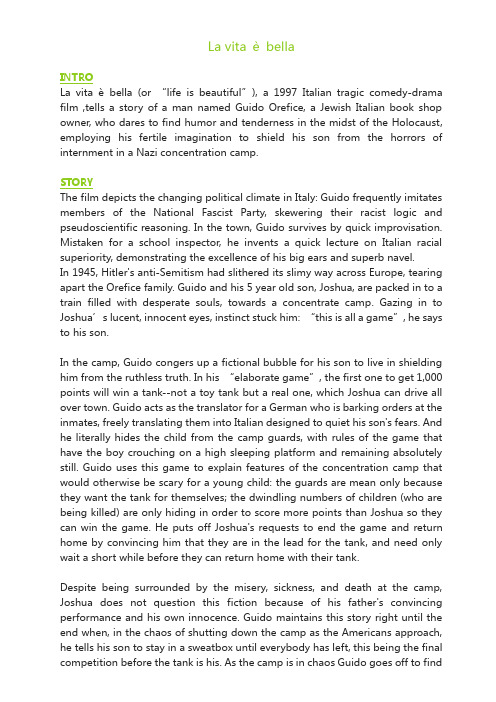
La vita èbellaINTROLa vita èbella (or “life is beautiful”), a 1997 Italian tragic comedy-drama film ,tells a story of a man named Guido Orefice, a Jewish Italian book shop owner, who dares to find humor and tenderness in the midst of the Holocaust, employing his fertile imagination to shield his son from the horrors of internment in a Nazi concentration camp.STORYThe film depicts the changing political climate in Italy: Guido frequently imitates members of the National Fascist Party, skewering their racist logic and pseudoscientific reasoning. In the town, Guido survives by quick improvisation. Mistaken for a school inspector, he invents a quick lecture on Italian racial superiority, demonstrating the excellence of his big ears and superb navel.In 1945, Hitler's anti-Semitism had slithered its slimy way across Europe, tearing apart the Orefice family. Guido and his 5 year old son, Joshua, are packed in to a train filled with desperate souls, towards a concentrate camp. Gazing in to Joshua’s lucent, innocent eyes, instinct stuck him: “this is all a game”, he says to his son.In the camp, Guido congers up a fictional bubble for his son to live in shielding him from the ruthless truth. In his “elaborate game”, the first one to get 1,000 points will win a tank--not a toy tank but a real one, which Joshua can drive all over town. Guido acts as the translator for a German who is barking orders at the inmates, freely translating them into Italian designed to quiet his son's fears. And he literally hides the child from the camp guards, with rules of the game that have the boy crouching on a high sleeping platform and remaining absolutely still. Guido uses this game to explain features of the concentration camp that would otherwise be scary for a young child: the guards are mean only because they want the tank for themselves; the dwindling numbers of children (who are being killed) are only hiding in order to score more points than Joshua so they can win the game. He puts off Joshua's requests to end the game and return home by convincing him that they are in the lead for the tank, and need only wait a short while before they can return home with their tank.Despite being surrounded by the misery, sickness, and death at the camp, Joshua does not question this fiction because of his father's convincing performance and his own innocence. Guido maintains this story right until the end when, in the chaos of shutting down the camp as the Americans approach, he tells his son to stay in a sweatbox until everybody has left, this being the final competition before the tank is his. As the camp is in chaos Guido goes off to find Dora, but while he is out he is caught by a Nazi soldier. The soldier makes the decision to execute Guido. Guido is led off by the soldier to be executed. While the soldier is leading him to his death, Guido passes byJoshua one last time, still in character and playing the game. The next morning, Joshua emerges from the sweatbox as the camp is occupied by an American armored division. Joshua thinks he has won the game because Guido had told him that whoever got to one thousand points would get a tank. The soldiers free all of the captives in the concentration camp and lead them to a safer place. While they are traveling, the soldiers allow Joshua to ride on the front of the tank with them. During their travels, Joshua spots Dora in the procession leaving the camp. Her mother, overwhelmed with happiness and relief, finds out that though after the tormenting experience of the concentrated camps, her son’s heart still remains untainted.REVIEWSThe movie has stirred up venomous opposition from the right wing in Italy. At Cannes, it offended some left-wing critics with its use of humor in connection with the Holocaust. What may be most offensive to both wings is its sidestepping of politics in favor of simple human ingenuity. The film finds the right notes to negotiate its delicate subject matter. And Benigni, the director and main actor of the film, isn't really making comedy out of the Holocaust, anyway. He is showing how Guido uses the only gift at his command to protect his son. If he had a gun, he would shoot at the Fascists. If he had an army, he would destroy them. He is a clown, and comedy is his weapon.WWII was defiantly a dark period in human history, and that there was nothing "funny" about this evil era that claimed the lives of 8 million innocent people. Yet "Life is Beautiful" was never offensive to me; it is a tribute to hope and love. I just introduced this film to my twelve year old daughters, to inspire them that even during the bleakest of times, the human spirit can triumph over despair.The movie actually softens the Holocaust slightly, to make the humor possible at all. In the real death camps there would be no role for Guido. But "Life Is Beautiful" is not about Nazis and Fascists, but about the human spirit. It is about rescuing whatever is good and hopeful from the wreckage of dreams, about hope for the future, about the necessary human conviction, or delusion, that things will be better for our children than they are right now.Extra info:Part of the film came from Benigni's own family history; before Roberto's birth, his father had survived three years of internment at the Bergen-Belsen concentration camp. The film was a critical and financial success, winning 3 Oscar awards.。
最后一次吃泡面英语作文
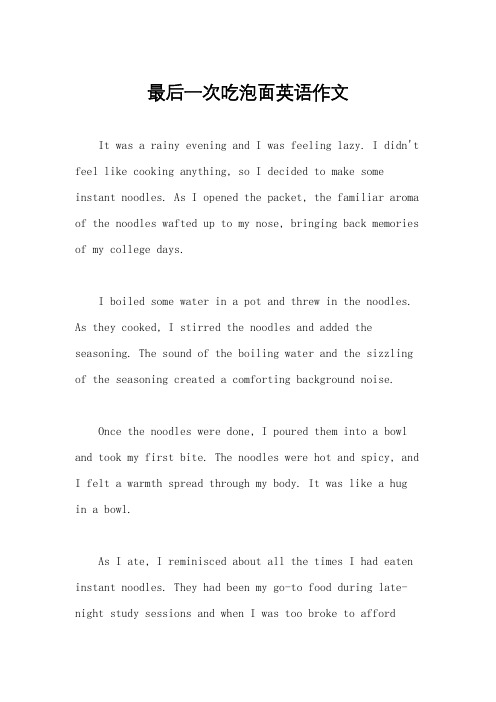
最后一次吃泡面英语作文It was a rainy evening and I was feeling lazy. I didn't feel like cooking anything, so I decided to make some instant noodles. As I opened the packet, the familiar aroma of the noodles wafted up to my nose, bringing back memories of my college days.I boiled some water in a pot and threw in the noodles. As they cooked, I stirred the noodles and added the seasoning. The sound of the boiling water and the sizzling of the seasoning created a comforting background noise.Once the noodles were done, I poured them into a bowl and took my first bite. The noodles were hot and spicy, and I felt a warmth spread through my body. It was like a hugin a bowl.As I ate, I reminisced about all the times I had eaten instant noodles. They had been my go-to food during late-night study sessions and when I was too broke to affordanything else. Despite their simplicity, they had always been a reliable source of comfort.As I finished my last bite, I felt a sense of satisfaction wash over me. It was the perfect end to a lazy evening. I knew that I would always have a soft spot for instant noodles, no matter how many fancy meals I ate in the future.。
再见詹姆斯先生作文英语
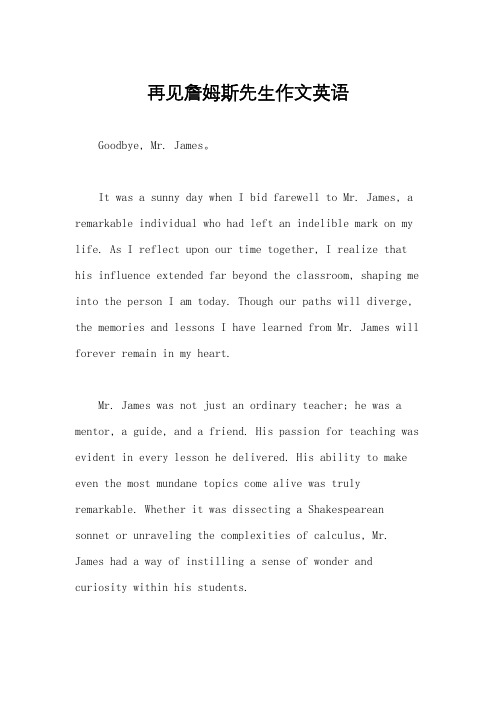
再见詹姆斯先生作文英语Goodbye, Mr. James。
It was a sunny day when I bid farewell to Mr. James, a remarkable individual who had left an indelible mark on my life. As I reflect upon our time together, I realize that his influence extended far beyond the classroom, shaping me into the person I am today. Though our paths will diverge, the memories and lessons I have learned from Mr. James will forever remain in my heart.Mr. James was not just an ordinary teacher; he was a mentor, a guide, and a friend. His passion for teaching was evident in every lesson he delivered. His ability to make even the most mundane topics come alive was truly remarkable. Whether it was dissecting a Shakespearean sonnet or unraveling the complexities of calculus, Mr. James had a way of instilling a sense of wonder and curiosity within his students.Beyond his exceptional teaching skills, Mr. James possessed a genuine care and concern for his students. He took the time to understand our individual strengths, weaknesses, and aspirations. He encouraged us to pursue our passions and never settle for mediocrity. Whenever I faced challenges, he was always there to offer guidance and support, instilling in me the belief that I had the power to overcome any obstacle.One of the most profound lessons I learned from Mr. James was the importance of perseverance. He taught us that failure was not something to be feared, but rather a stepping stone towards success. He shared stories of his own struggles and setbacks, highlighting the resilience and determination required to achieve greatness. This lesson has stayed with me throughout my life, reminding me to never give up, even in the face of adversity.Mr. James not only focused on academic excellence but also emphasized the importance of personal growth. He encouraged us to explore our interests, engage in extracurricular activities, and develop our character. Hebelieved that education extended beyond textbooks and classrooms, and that true learning occurred through experiences and interactions with the world around us. Under his guidance, I discovered new passions, developed leadership skills, and built lifelong friendships.As I prepare to embark on a new chapter of my life, I am filled with a mix of excitement and nostalgia. Saying goodbye to Mr. James is bittersweet, as I know that his impact on my life will endure. His unwavering dedication to his students and his unwavering belief in our potential have shaped me into a confident and resilient individual.In conclusion, bidding farewell to Mr. James is not merely saying goodbye to a teacher, but to a mentor, a guide, and a friend. His passion for teaching, his genuine care for his students, and his emphasis on personal growth have left an indelible mark on my life. As I continue on my journey, I will carry the lessons and memories from Mr. James with me, forever grateful for the privilege of being his student. Goodbye, Mr. James.。
从死亡中感悟人生浅析美国电影《遗愿清单》

此外,《死亡诗社》也强调了教师的作用。教师不仅是知识的传播者,更是引 导学生探索世界的领路人。他们需要用独特的教学方式激发学生的激情,帮助 他们发现自我,培养他们的创新精神。正如基汀所做的那样,教师应该是学生 的激励者,是他们心灵的引导者。
电影《死亡诗社》的音乐也值得一提。配乐大师莫里斯•雅尔的配乐充分表现 出了电影中浓烈的生命质感和灵魂光华,为电影增添了许多色彩。他的音乐与 电影的情节相得益彰,让观众更加深入地感受到电影所要表达的情感。
《烦恼人生》是一部关于生活的小说,讲述了我们每个人都可能遭遇的种种烦 恼。从求学、工作到婚姻、家庭,小说中的主人公在生活的每一个阶段都面临 着无尽的困扰。然而,正是这些困扰和挑战促使他不断地成长、蜕变。
在感悟《烦恼人生》的过程中,我深刻体会到生活的波折与磨难对于一个人的 成长具有重要意义。正如小说中的主人公一样,我们在面对困境时,或许会感 到无助与迷茫。但正是这些挫折与考验,让我们变得更加坚强、成熟。
通过深入剖析《遗愿清单》,我们可以从中汲取智慧,感悟人生。死亡是生命 的一部分,面对它,我们才能更好地理解生活的意义。让我们学会珍惜生命, 珍惜身边人,勇敢地去追求梦想,体验生活的美好。不要等到失去才后悔,让 我们的人生成为一份无悔的遗愿清单。
标题:冲破传统,点燃激情从美 国电影《死亡诗社》谈教育
从死亡中感悟人生浅析美国电影《遗愿 清单》
基本内容
在生命的尽头,我们会留下什么?美国2004年罗伯·莱纳执导的电影《遗愿清 单》带给我们这样的思考。这部电影讲述的是两位身患癌症的病人,卡特和爱 德华,在生命的最后阶段,共同完成他们内心所想的“遗愿清单”的故事。
卡特和爱德华都是60多岁的老人,他们的生活轨迹截然不同。卡特是一位博学 多才的教授,而爱德华则是一位黑人职业管道工。虽然他们的身份背景、生活 方式大相径庭,但他们在同一家病房相遇,每日开着玩笑一起进行治疗。不知 不觉中,两个相见不到几个月的人,却仿佛成为了生死之交。
人间世临终关怀观后感1000字
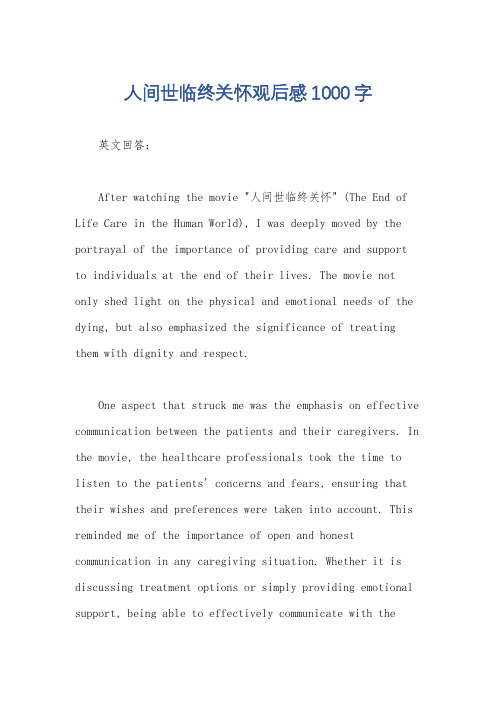
人间世临终关怀观后感1000字英文回答:After watching the movie "人间世临终关怀" (The End of Life Care in the Human World), I was deeply moved by the portrayal of the importance of providing care and support to individuals at the end of their lives. The movie not only shed light on the physical and emotional needs of the dying, but also emphasized the significance of treating them with dignity and respect.One aspect that struck me was the emphasis on effective communication between the patients and their caregivers. In the movie, the healthcare professionals took the time to listen to the patients' concerns and fears, ensuring that their wishes and preferences were taken into account. This reminded me of the importance of open and honest communication in any caregiving situation. Whether it is discussing treatment options or simply providing emotional support, being able to effectively communicate with theperson in need is crucial.Another aspect that resonated with me was the importance of providing holistic care. The moviehighlighted the need to address not only the physical pain and symptoms, but also the emotional and spiritual needs of the patients. This reminded me of the saying "treat the patient, not just the disease." It is essential to consider the person as a whole, taking into account their beliefs, values, and desires. By doing so, we can provide care that is truly person-centered and tailored to their individual needs.Furthermore, the movie highlighted the significance of family involvement in end-of-life care. In several scenes, family members were shown providing comfort and support to their loved ones, and healthcare professionals actively encouraged their participation. This reminded me of the importance of involving the family in the caregiving process. Family members can offer emotional support, help make decisions, and provide a sense of familiarity and comfort to the patient. It is important to recognize andrespect the role that family plays in the lives of the dying.Overall, "人间世临终关怀" served as a powerful reminder of the importance of compassionate and person-centered care for individuals at the end of their lives. It highlighted the significance of effective communication, holistic care, and family involvement. This movie has inspired me to reflect on my own approach to caregiving and strive to provide the best possible care to those in need.中文回答:观看电影《人间世临终关怀》之后,我深受其感动,对于在临终阶段提供关怀和支持的重要性有了更深刻的认识。
乔布斯和比尔盖茨最后一次同台对话「中英双语」
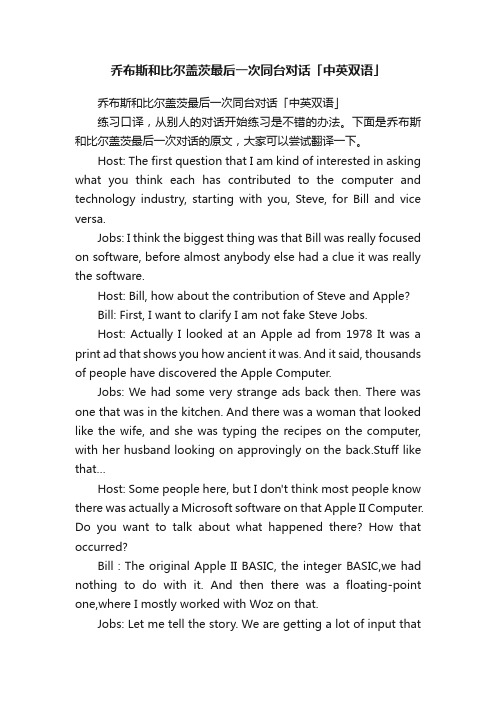
乔布斯和比尔盖茨最后一次同台对话「中英双语」乔布斯和比尔盖茨最后一次同台对话「中英双语」练习口译,从别人的对话开始练习是不错的办法。
下面是乔布斯和比尔盖茨最后一次对话的原文,大家可以尝试翻译一下。
Host: The first question that I am kind of interested in asking what you think each has contributed to the computer and technology industry, starting with you, Steve, for Bill and vice versa.Jobs: I think the biggest thing was that Bill was really focused on software, before almost anybody else had a clue it was really the software.Host: Bill, how about the contribution of Steve and Apple?Bill: First, I want to clarify I am not fake Steve Jobs.Host: Actually I looked at an Apple ad from 1978 It was a print ad that shows you how ancient it was. And it said, thousands of people have discovered the Apple Computer.Jobs: We had some very strange ads back then. There was one that was in the kitchen. And there was a woman that looked like the wife, and she was typing the recipes on the computer, with her husband looking on approvingly on the back.Stuff like that…Host: Some people here, but I don't think most people know there was actually a Microsoft software on that Apple II Computer. Do you want to talk about what happened there? How that occurred?Bill:The original Apple II BASIC, the integer BASIC,we had nothing to do with it. And then there was a floating-point one,where I mostly worked with Woz on that.Jobs: Let me tell the story. We are getting a lot of input thatpeople want this BASIC to be floating point. Please! Please make this floating point. We are begging Woz.Host: Who is "we"? How many people at Apple?Jobs: Well, me.We are begging Woz to make this floating point. He just never does it. He wrote it by hand on paper.Host: How much was it? I think you were telling us earlier.Bill: Oh, $31,000. For the floating point BASIC. And I flew out to Apple and spent two days there getting the cassette…The cassette tapes were the main ways people stored things at the time. And, you know, that was fun. So we were working together. The schedules were uncertain. The quality was uncertain. And the price...When Steve first came up, it was gonna be an a lot cheaper computer than it end up being. But that was fine.So we made this bet that this paradigm shift would be the graphic interface. Particularly the Macintosh will make it happen with 128K of memory. 22k of which was for the screen buffer, 14k was for the operating system.Host: 14K?!Bill: We were actually negotiating a deal to invest and make some commitment with Gil Amelio. Next thing I know, Steve called me and said, "Don't worry about that negotiation with Gil Amelio,you can just talk to me now."How do you look at yourself in this landscape today? You are competitors in certain ways. We watched the commercials.You get annoyed at each other from time to time. I have to confess I like the PC guy.Jobs: Yes, he is great. I like him.You know the art of those commercials is not to be mean, but actually for the guys to like each other.Bill: Thanks!Jobs: PC guys are great.They got a great heart.Bill: In a few cases like the Zune, if you go over to that group. They think of Apple as the competitor. They love the fact that Apple has created a gigantic market. And they are gonna try and come in and contribute something to that. We love them, 'coz they are all customers. The same processors essentially that the Mac had this is one of those great ironies,that they were switching away from that processor, while the Xbox 360 was adopting it. But for good reasons, actually in both cases. We try and do things that way. So that was the development system for the early people getting their software ready for the introduction of Xbox 360.Jobs: And we never ran an ad on that.Bill: I see. Admirable restraint. That's wonderful restraint.Jobs: There were hundreds of them.Bill: Steve is so known for his restraints.Host: I assume you carry tablet PC.I don't know what brand it is. Maybe you change them up. I don't know. You obviously carry a Macbook Pro, I would guess.Jobs: Yeah. Well, and an iPhone.Host: You have one?Jobs: I do.Host: Right here?Jobs: Yes.Host: He has one. He took it out before. Really. Is the iPhone and some of the other smartphone. I know you believe the iPhone is much better than the other smartphones at the moment. But are these things.. are they just computers in a different form factor?Jobs: You know we are working on some things that I can'ttalk aboutHost: Again.Jobs: Again, yeah.Host: Very beautiful, yeah! There used to be a saying, isn't it at Apple… Gonna blow us away, though, when you can talk about it. Blow us away, wow, it's great. There used to be a saying at AppleJobs: Isn't it funny, a ship that leaks from the top?Host: That's kind of like a sweater without sleeves is a vest.Jobs: That's what they used to say about me when I was in my 20s.Host: I am gonna ask a more personal question. We have just a minute before going to open up for questions. What's the greatest -I'm not gonna call this a Barbara Walters moment and ask you what tree you'd like to be, but…She would love to be Barbara Walters, let me just tell you. No, I would not. What's the greatest misunderstanding...Jobs: Ding...Host: Thank you, Steve.about your relationship? You're obviously gonna go down in history, history books already set, kind of thing. But what's the greatest misunderstanding in your relationship and about each other? What would you say about this idea of cat fight? Which one of the many?Jobs: We've kept our marriage secret for over a decade now.Host: Canada! That trip to Canada!Jobs: Generally, we were both the youngest guys in the room, individually or together. I am about 6 months older than he is, but roughly the same age. And now when we are working at our respective companies, I don't know about you, but I am the oldest guy in the room, most of the time. That's why I love beinghere.Host: Happy to oblige.下载文档。
MetLife
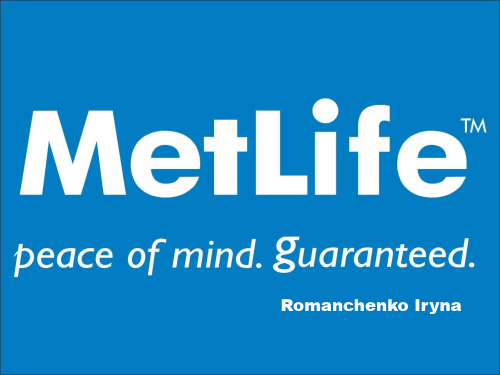
How did MetLife come to be?
In 1930, MetLife was the undisputed leader of the insurance industry. The company had invested a substantial portion of its assets in urban and farm mortgages and in loans to individuals. But the collapse of real estate values during the Great Depression and the decline of interest rates made these customary investment options less attractive. In response to that, the company reduced the percentage of individual mortgages in favor of public utility bonds, investments in government securities, and loans for commercial real estate. In 1931 MetLife provided the outside capital to build Rockefeller Center. It also lent money to construct the Empire State Building in 1929. The company's housing program begun in the 1920s and completed after World War II.
再见人生作文模板英文高中
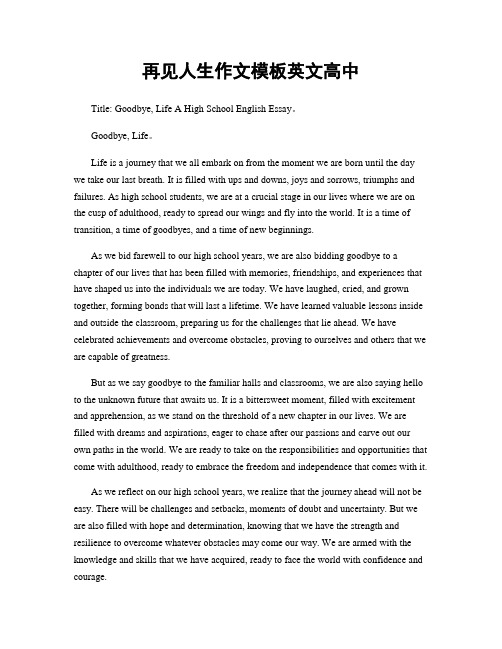
再见人生作文模板英文高中Title: Goodbye, Life A High School English Essay。
Goodbye, Life。
Life is a journey that we all embark on from the moment we are born until the day we take our last breath. It is filled with ups and downs, joys and sorrows, triumphs and failures. As high school students, we are at a crucial stage in our lives where we are on the cusp of adulthood, ready to spread our wings and fly into the world. It is a time of transition, a time of goodbyes, and a time of new beginnings.As we bid farewell to our high school years, we are also bidding goodbye to a chapter of our lives that has been filled with memories, friendships, and experiences that have shaped us into the individuals we are today. We have laughed, cried, and grown together, forming bonds that will last a lifetime. We have learned valuable lessons inside and outside the classroom, preparing us for the challenges that lie ahead. We have celebrated achievements and overcome obstacles, proving to ourselves and others that we are capable of greatness.But as we say goodbye to the familiar halls and classrooms, we are also saying hello to the unknown future that awaits us. It is a bittersweet moment, filled with excitement and apprehension, as we stand on the threshold of a new chapter in our lives. We are filled with dreams and aspirations, eager to chase after our passions and carve out our own paths in the world. We are ready to take on the responsibilities and opportunities that come with adulthood, ready to embrace the freedom and independence that comes with it.As we reflect on our high school years, we realize that the journey ahead will not be easy. There will be challenges and setbacks, moments of doubt and uncertainty. But we are also filled with hope and determination, knowing that we have the strength and resilience to overcome whatever obstacles may come our way. We are armed with the knowledge and skills that we have acquired, ready to face the world with confidence and courage.So, as we bid goodbye to our high school years, we do so with gratitude and optimism. We are thankful for the memories we have made, the friendships we have formed, and the lessons we have learned. We are grateful for the support and guidance of our teachers, mentors, and parents who have helped us along the way. And as we step into the next chapter of our lives, we do so with the knowledge that the best is yet to come.In conclusion, as we bid farewell to our high school years, we are filled with a mix of emotions sadness for what we are leaving behind, and excitement for what lies ahead. We are saying goodbye to the past, but we are also saying hello to the future. We are ready to embrace the challenges and opportunities that come our way, ready to make our mark on the world. Goodbye, high school life we are ready for whatever comes next.。
人生最后的晚餐英语作文
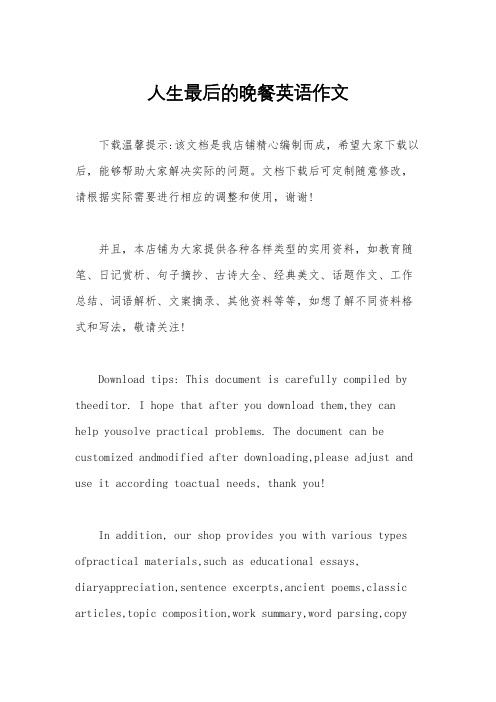
人生最后的晚餐英语作文下载温馨提示:该文档是我店铺精心编制而成,希望大家下载以后,能够帮助大家解决实际的问题。
文档下载后可定制随意修改,请根据实际需要进行相应的调整和使用,谢谢!并且,本店铺为大家提供各种各样类型的实用资料,如教育随笔、日记赏析、句子摘抄、古诗大全、经典美文、话题作文、工作总结、词语解析、文案摘录、其他资料等等,如想了解不同资料格式和写法,敬请关注!Download tips: This document is carefully compiled by theeditor. I hope that after you download them,they can help yousolve practical problems. The document can be customized andmodified after downloading,please adjust and use it according toactual needs, thank you!In addition, our shop provides you with various types ofpractical materials,such as educational essays, diaryappreciation,sentence excerpts,ancient poems,classic articles,topic composition,work summary,word parsing,copyexcerpts,other materials and so on,want to know different data formats andwriting methods,please pay attention!晚餐,那是一天的尾声,是日常与生活的交汇,是家人围坐,共享的时刻。
2023年《遗愿清单》观后感
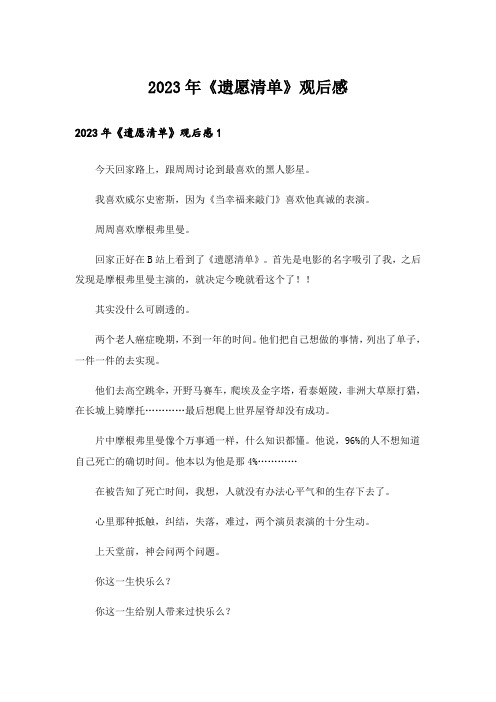
2023年《遗愿清单》观后感2023年《遗愿清单》观后感1今天回家路上,跟周周讨论到最喜欢的黑人影星。
我喜欢威尔史密斯,因为《当幸福来敲门》喜欢他真诚的表演。
周周喜欢摩根弗里曼。
回家正好在B站上看到了《遗愿清单》。
首先是电影的名字吸引了我,之后发现是摩根弗里曼主演的,就决定今晚就看这个了!!其实没什么可剧透的。
两个老人癌症晚期,不到一年的时间。
他们把自己想做的事情,列出了单子,一件一件的去实现。
他们去高空跳伞,开野马赛车,爬埃及金字塔,看泰姬陵,非洲大草原打猎,在长城上骑摩托…………最后想爬上世界屋脊却没有成功。
片中摩根弗里曼像个万事通一样,什么知识都懂。
他说,96%的人不想知道自己死亡的确切时间。
他本以为他是那4%…………在被告知了死亡时间,我想,人就没有办法心平气和的生存下去了。
心里那种抵触,纠结,失落,难过,两个演员表演的十分生动。
上天堂前,神会问两个问题。
你这一生快乐么?你这一生给别人带来过快乐么?无论贫穷,富有,每个人都有自己的苦恼。
有些事情,也不是有钱就可以解决的。
比如临终前的家人团聚,和自己心爱的人跳一支舞…………其中有一段挺让我难过的。
摩根说:终于孩子们都上班上学走了,可以安安静静的跟妻子过日子,两个人手挽着手走在街头,却已经没有当初的那种感觉了。
我们老了,是否也都会变成这个样子?建议大家去看一下。
很多影评对此片褒贬不一。
但是我认为值得一看。
没有刺激,没有悲痛。
有一点小小的美式幽默,还有很多很多的感动!想做什么事情,赶紧去做吧!!阿光同学做的好。
将自己的梦想写在梦想板上,无论大事小事。
在有生之年,去完成吧!2023年《遗愿清单》观后感2总要等到死亡时,我们才会发现人生还要好多事情没有去做。
时间如白驹过隙,要珍惜当下,去做自己想做的事这些道理对我们大多数人来说,早已经烂熟于心,但是我十分肯定,可能等到我们面临死亡时,依然会和两个主角一样,有好多事情没来得及去做。
其实并不是我们不知道,而是明知道却总是一而再再而三地给自己找借口。
生命的意义——《遗愿清单》(the bucket list)观后感
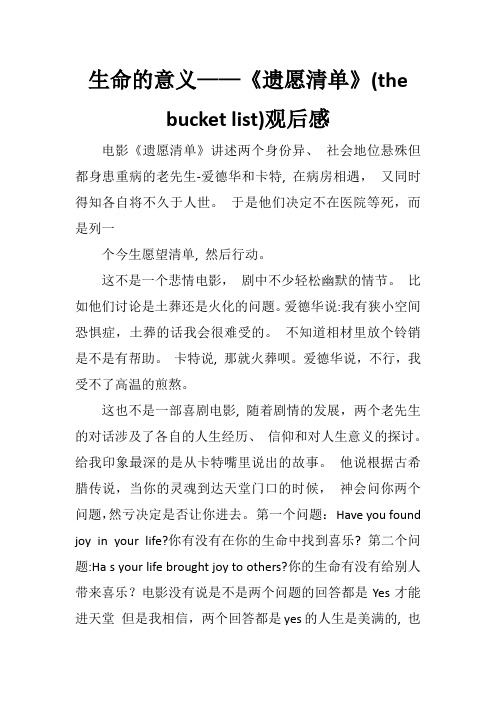
生命的意义——《遗愿清单》(the
bucket list)观后感
电影《遗愿清单》讲述两个身份异、社会地位悬殊但都身患重病的老先生-爱德华和卡特, 在病房相遇,又同时得知各自将不久于人世。
于是他们决定不在医院等死,而是列一
个今生愿望清单, 然后行动。
这不是一个悲情电影,剧中不少轻松幽默的情节。
比如他们讨论是土葬还是火化的问题。
爱德华说:我有狭小空间恐惧症,土葬的话我会很难受的。
不知道相材里放个铃销是不是有帮助。
卡特说, 那就火葬呗。
爱德华说,不行,我受不了高温的煎熬。
这也不是一部喜剧电影, 随着剧情的发展,两个老先生的对话涉及了各自的人生经历、信仰和对人生意义的探讨。
给我印象最深的是从卡特嘴里说出的故事。
他说根据古希腊传说,当你的灵魂到达天堂门口的时候,神会问你两个问题,然亏决定是否让你进去。
第一个问题:Have you found joy in your life?你有没有在你的生命中找到喜乐? 第二个问题:Ha s your life brought joy to others?你的生命有没有给别人带来喜乐?电影没有说是不是两个问题的回答都是Yes才能进天堂但是我相信,两个回答都是yes的人生是美满的, 也
是我愿意追求的。
这是一部寓教于乐的好电影。
故事不复杂, 道理不难懂。
两位老戏骨(杰克尼克尔森Jack Nicholson和摩根弗里曼Morgan Freeman) 的精湛演技以及优美的电影配乐都令人回味无穷。
